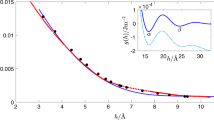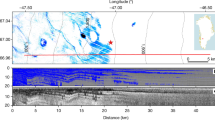Abstract
IN frozen soils water movement towards an ice front can occur, leading to the formation of ice lenses, frost heaving and damage to roads and other structures. During the past decades many attempts have been made to explain the transport phenomena involved, fundamental contributions being made by Everett1 and Takagi2, among others. We present here experimental results on the influence of pressure on ice growth; they accord with thermodynamic theory.
This is a preview of subscription content, access via your institution
Access options
Subscribe to this journal
Receive 51 print issues and online access
$199.00 per year
only $3.90 per issue
Buy this article
- Purchase on Springer Link
- Instant access to full article PDF
Prices may be subject to local taxes which are calculated during checkout
Similar content being viewed by others
References
Everett, D. H., Trans. Faraday Soc., 57, 1541–1550 (1961).
Takagi, S., Water Resources Res., 6, 736–749 (1970).
Vignes, M., and Dijkema, K. M., J. Colloid Interface Sci., 49, 165–172 (1974).
Vignes, M., Lett. appl. engng Sci., 2, 213–226 (1974).
Author information
Authors and Affiliations
Rights and permissions
About this article
Cite this article
BIERMANS, M., DIJKEMA, K. & DE VRIES, D. Water movement in porous media towards an ice front. Nature 264, 166–167 (1976). https://doi.org/10.1038/264166a0
Received:
Accepted:
Issue Date:
DOI: https://doi.org/10.1038/264166a0
Comments
By submitting a comment you agree to abide by our Terms and Community Guidelines. If you find something abusive or that does not comply with our terms or guidelines please flag it as inappropriate.



